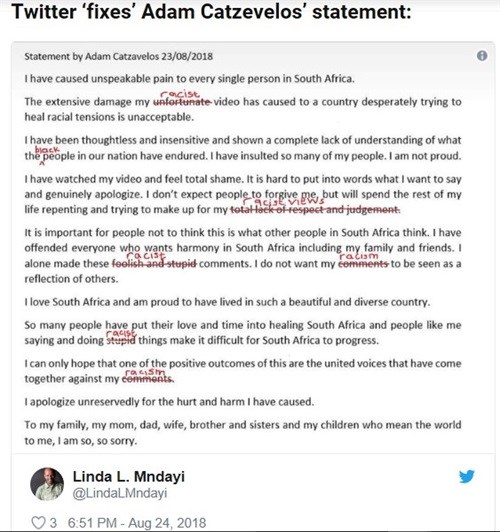
Top stories






More news


Marketing & Media
Ads are coming to AI. Does that really have to be such a bad thing?














A similar Black Twitter space with a different mission emerged in South Africa in 2010, and its mandate was to virtually ‘bring together’ a collective of actively conscious black middle-class users on this platform to engage on a variety of socioeconomic, political issues and sometimes lighthearted social commentaries and banter around Sunday night television.
The difference was that Black Twitter in South Africa was unintentionally exclusive and closed off in relation to the US format. This space was indirectly reserved for the few people who could intellectually engage on a depth of dialogues that were historically reserved for academic spaces because of the language barrier. Since then, the space has gone a little bit more mainstream.
Black Twitter in South Africa has become an autonomous space that has grown a life of its own. Over the years, the platform has become a romanticised court of public opinion that is being led by the black professionals who now have the power to influence headline news stories and what makes it into the front pages of the biggest media houses locally.
We’ve even witnessed some of its leading twelebs (Twitter celebrities) make it into popular culture as pseudo influencers and celebs, thus local media houses no longer shy away from referencing and or quoting tweets from the Black Twitter-verse. One of the biggest things to come out of this space has been its ability to make and break brands, thus as self-elected speakers and representatives of all things black, they stand for what’s in the best interest of the group by calling-out and cancelling both personal and corporates brands that undermine black culture and black people.
The platform has also become infamous for activating and igniting conversations that were historically reserved for private spaces with people you trust, Black Twitter has blurred the lines between the private and the public. The community now uses their social power and currency to disrupt and hold those in different positions of leadership and corporate brands accountable for their misgivings. Thus historically, brands and marketers had no interest in marketing to this group because there was not enough disposable income going in and out of the black community owing to the financial gap left by apartheid.
But since 1994, there has been a growing middle-class community that has garnered the interest of companies and brands, and often, these brands still fail to create narratives that truly reflect the lived experiences of these new class of black consumers. In the last few years, we’ve seen many create products and content that poorly misrepresented the black people and their culture, with Black Twitter leading online conversations that sort to critique and scrutinise such narratives. In the last year, we’ve seen a shift by the users who wanted to take their influence one step further.
Online bashing was not enough to hold such brands accountable, so more offline efforts needed to be taken to essentially devastate the commerciality of implicated brands. Hence the idea to boycott brands that misrepresent black people was born, H&M was one of the first to feel this protest when their global business created an ad that portrayed a black boy in a sweater that made black people feel like he was being equated to a monkey. In South Africa, this ad resulted in people boycotting the stores for a short time after it came out.
The biggest backlash from the Twitter-Verse came to life when a white male whose family owned local businesses that predominately targeted black consumers (because they were in areas with mainly black people) uploaded a video from his holiday in Greece boasting about being on a beach with no black people, Black Twitter would hear none of it.


In his gloat, he referred to black people as ‘Kaffirs’. He later apologised (see figure 1) when #BlackTwitter promised to boycott all the businesses his family owned, but his apology fell on deaf ears because it was seen as disingenuous. His video resulted in financial implications that not only affected his family business, but also workers were devastated by the ripple effects of his racism because they lost their jobs when the consumers exercised their right to spend their money elsewhere.
Black consumers made sure they put their money where their mouths were so that this act of racism didn’t turn out to be just another empty and fleeting outrage with no real consequences for the companies and brands liable.
We’ve seen this trend to boycott brands also affecting the financial bottom line of Momentum Insurance when they were involved in a public distribute with a client recently. Thus consumers felt the insurer was on the wrong side of the dispute in a context where consumers are already very suspicious of insurance companies and other big corporations as a whole.
So in Black Twitter style, consumers from all racial and cultural backgrounds were urged to boycott the insurer by taking their money elsewhere (see figure 3). When the pressure mounted, the insurance company eventually gave in to the public outcry.

Thus, the rise of Black Twitter has ensured that black consumers understand their power as a majority, employing them to exercise it to disempower and dismantle brands and companies that take them for granted. Empowering them to use their financial power to hit those brands where it hurts, in the pocket. This was such an important shift in the mindset and behaviour of this consumer segment because historically Black Twitter was only seen as a platform with a bug greater than its bite.
The social backlash coming out of this space didn’t seem to have any real-world impact outside of social media, so it was noise that brands could easily ignore for a long time since it had no impact on their business margin. This new educated middle-class consumer no longer takes their buying power for granted, they’ve stopped underestimating their ability to cripple the financial success of a business that takes no accountability for how it represents the interests of this black and conscious consumer.
In this competitive market, black consumers now have the power to exercise collective choice in a market that offers them alternatives. Consumers now have the upper hand to influence purchasing behaviour, and Black Twitter has helped to actively enforce that power on the ground when it matters the most.
